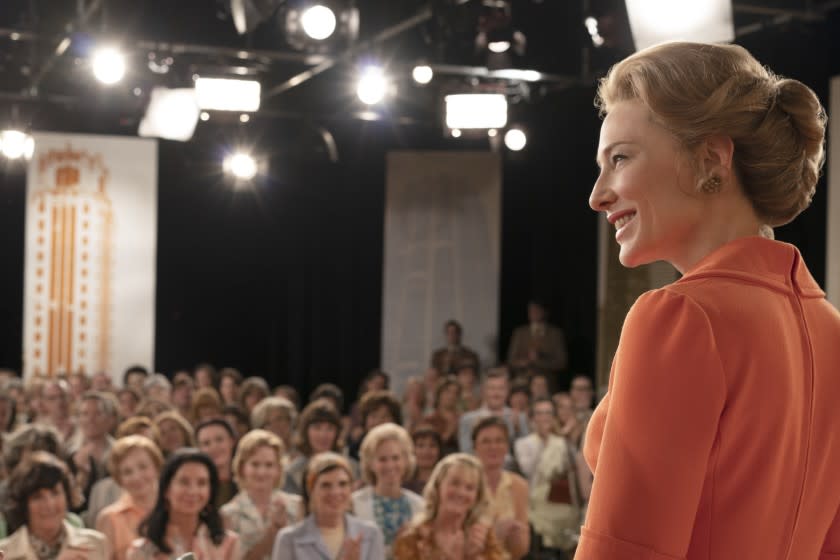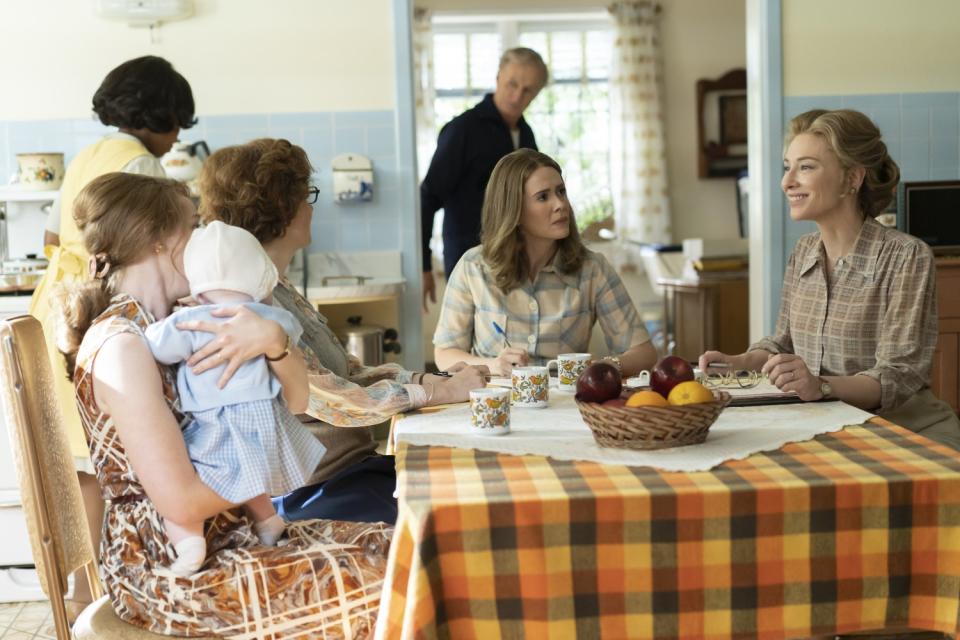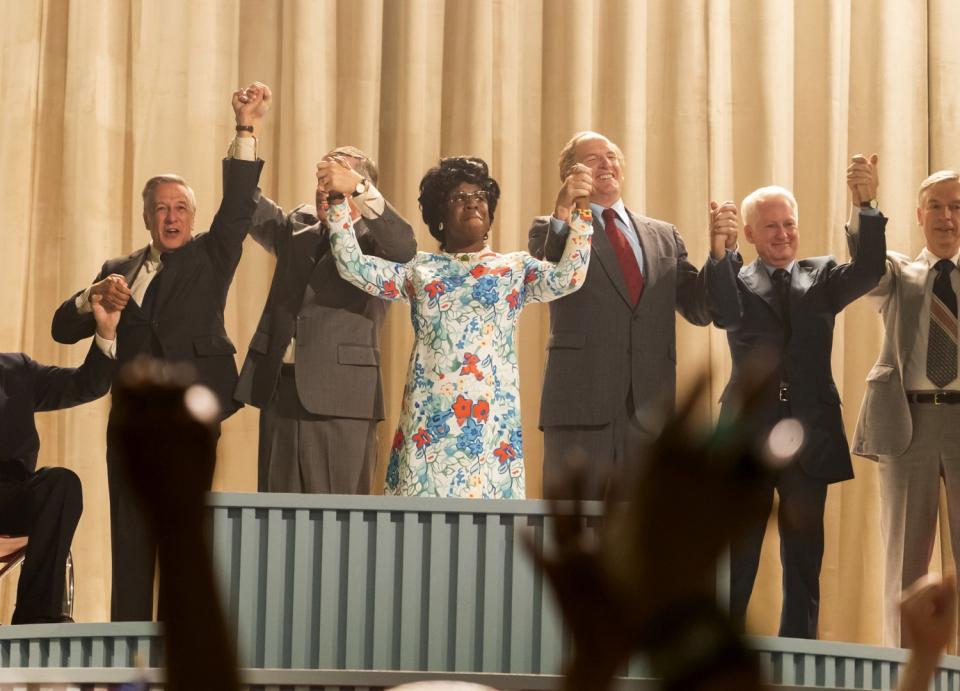How 'the most liberated woman in America' became TV's next great antihero

If your knowledge of 20th century American history comes from pop culture, chances are you know next to nothing about Second Wave feminism. Perhaps you're aware of Ruth Bader Ginsburg because of the biopic “On the Basis of Sex” or from Kate McKinnon's impression of her on "Saturday Night Live."
But that’s probably it.
Because, unlike the roughly contemporaneous civil rights and antiwar movements, which have been memorialized in numerous award-winning movies and miniseries, the women’s movement of the 1960s and ’70s has largely been overlooked by pop culture — whether because so many movies or TV shows are created by men or because the front lines in the battle, such as abortion rights, remain controversial.
Now, the leaders of the women’s movement — and arguably their greatest antagonist — are getting their due in “Mrs. America,” an all-star limited series about the decade-long battle over the Equal Rights Amendment, a measure that initially enjoyed widespread, bipartisan support but was ultimately stalled by conservative activists.
The drama, created by Dahvi Waller and premiering Wednesday on FX on Hulu, delves into both sides in this pitched culture war. It chronicles the efforts of feminist leaders such as Gloria Steinem (Rose Byrne), Bella Abzug (Margo Martindale) and Shirley Chisholm (Uzo Aduba) to enshrine gender equality into the Constitution, as well as the work of conservative crusader Phyllis Schlafly (Cate Blanchett) and an army of bread-baking homemakers who stopped the ERA and, in the process, helped reshape the Republican Party.
Spanning the years 1971 to 1980, “Mrs. America” tells the overarching story of the women’s movement and its opposition over the course of nine episodes centered on different figures from the era. The series offers nuanced portraits of well-known leaders such as Steinem, the glamorous cofounder of Ms. magazine, and Betty Friedan (Tracey Ullman), author of the groundbreaking “The Feminine Mystique.” But it also examines women with more limited Wikipedia profiles, such as Republican feminist Jill Ruckelshaus (Elizabeth Banks).
And it brings renewed attention to Schlafly, who founded the influential Eagle Forum and who died in 2016 at age 92 — not long after endorsing Donald Trump, a fellow political outsider who channeled anxiety about cultural change into an unexpected victory — and remains a revered figure on the religious right.
“Mrs. America” suggests that Schlafly opportunistically embraced the cause of defeating the ERA because, as a woman whose great passion had been national defense and the battle against communism, she could advance only so far within the Republican Party.
Premiering during an election year that has already been marred by debates about sexism in politics, “Mrs. America” offers a timely examination of female political power.
“There's no point in delving into this period unless it's going to reveal something about where we are now,” says Blanchett, who is making her first appearance in an American television series with “Mrs. America.” “The reason for me to want to do this was to reverse-engineer how we got to a place where equality was such a political hot button and also reverse-engineer how we got to the backlash that we're living in right now. And living through, I hope.”

Even Waller says her understanding of the feminist movement was limited before she wrote “Mrs. America.” She’d read “The Feminine Mystique” and Susan Faludi's “Backlash: The Undeclared War Against American Women,” but she didn’t know much about Abzug or Chisholm. “I was only as familiar as you would be from the one women's studies course we all did in college,” says Waller, who wrote “The Beautiful Girls,” a standout episode of “Mad Men” that poignantly captured a rich spectrum of female experiences.
Executive producer Stacey Sher first approached her about the series as the 2016 campaign was casting renewed spotlight on women in politics. "I thought it would be interesting to tell the story of the fight over the Equal Rights Amendment from the point of view of the spoiler,” says Sher.
Waller, a self-professed political junkie, sparked to the premise. She felt that by focusing on Schlafly, the leader of the backlash, “maybe we'd have a better understanding of the cyclical nature of progress.” She was also excited to write a political drama about women, she says, “because all the political dramas that I grew up loving were about men. And women, if they were in it at all, were either victims or wives.”
After selling the show to FX, Waller poured herself into research, devouring every news article about Schlafly, Steinem and their contemporaries she could get her hands on, as well as biographies such as “Phyllis Schlafly: The Sweetheart of the Silent Majority” — whose author, Carol Felsenthal, was enlisted as a consulting producer on the series — and the books written by the women themselves. “Sometimes I wish they were a little less prolific, because I'm like, 'How many memoirs did Betty Friedan write?'” Waller jokes. April Smith, a former showrunner on "Cagney & Lacey" who was involved in the feminist movement in the ’70s, was hired as a writer to help provide first-hand perspective on the material.
But Waller also made the conscious choice not to speak with anyone portrayed in the series who was still alive, or their children, “because then you're bound to their version of events,” she says. (Anne Schlafly Cori, chairman of the Eagle Forum and Schlafly’s daughter, said she had not seen the series but disputed what she understood of its portrayal of her mother. “The truth is that Phyllis inspired women, women admired her, and Phyllis encouraged and mentored women to become leaders,” she wrote in an email.)

Waller quickly saw the need to expand beyond Schlafly and tell a larger story about women in America, to create “an epic show with all the players from the women's movement having equal time on-screen,” she said.
She also felt it was essential that the series take an intersectional approach so it was “not just about white feminists,” she says. Since Schlafly only debated other white women, Waller had to find creative ways to weave in the experiences of black feminists such as Chisholm, who made history with her 1972 run for the Democratic Party's presidential nomination — and the reluctance of some white feminists to support her — is the focal point of the third episode.
Aduba, who filmed “Mrs. America” right after production of the final season of “Orange Is the New Black,” was drawn to a project that cast a spotlight on so many accomplished but overlooked women. “I'm not someone with my head in the sand, and I didn't know there were so many women who came together to light this match,” she says, noting that school taught her “the only women who shaped this country are Betsy Ross and Amelia Earhart. But these women all had a real impact on the world. I'm glad that they're getting their time.”

"Mrs. America" portrays Schlafly as a fascinating bundle of contradictions, an ambitious, highly accomplished mother of six and bestselling author who consistently worked outside the home yet vehemently defended traditional gender roles, seemed to view complaints about sexism as a sign of weakness and willfully misrepresented the impact of the ERA on women's lives. We also meet the women who rallied around her cause, including Eagle Forum member Rosemary Thomson (Melanie Lynskey) and close friend Alice Macray (a composite character played by Sarah Paulson). In one of the series' key lines, Abzug slams what she sees as Schlafly’s hypocrisy, calling her “the most liberated woman in America."
It was a common line of argument from the feminists of the era, but Waller views Schlafly through a different lens — as someone “motivated by a mix of ambition, opportunism, religious beliefs and childhood trauma. There's a whole cocktail. I was excited to put that out there because we have so many male antiheroes on television that are allowed to be so complicated and contradictory and hypocritical and very few examples of female antiheroes.”
But it was essential to find an actress who could carry off the role without descending into caricature. “When Cate said yes, I felt I could exhale,” Waller says.
Blanchett, a producer on “Mrs. America,” also researched fanatically, watching hours of footage to capture Schlafly’s distinctive mannerisms and noting what she calls the “simplification of her message” over the years.
Learning more about Schlafly’s childhood during the Great Depression was essential to understanding a character Blanchett describes as “a monumental overachiever” who saw herself as a political outsider long after she became a central player in conservative politics. “There’s a fear of not being able to fend for herself,” says Blanchett, who thinks Schlafly saw "the Libbers" as a threat to the foundational stability of the country. “She thought this change is happening too much and if you start to erode the traditional family unit, then America is lost.”

Byrne had the daunting task of playing the most famous and immediately recognizable figure in the series and humanizing someone who has been an icon for half a century. “There is so much projected onto Gloria already, how do we really look at the more personal side of her?” says Byrne, who plays Steinem as idealistic yet tough, willing to take flak from feminists and antifeminists alike while struggling to diversify the movement.
“When you’re playing someone who is really married to a movement like that, it’s not interesting if it’s just a puff piece. It’s far more interesting when you discuss their flaws and what’s the cost on their life, this devotion to one thing, because there’s always a cost.”
The ensemble includes a number of performers who, like Byrne, are known for their comedic chops, including Aduba, Ullman and Niecy Nash as Flo Kennedy. Their witty performances offer a counter to the stereotype of the shrill, humorless feminist. Even Blanchett’s Schlafly is a charismatic, unflappable bulldozer, not a self-righteous scold.
“One of the things I think came out of the 2016 election is how permissible it is to rag on women and to denigrate women and to insult women publicly even today,” Waller says. “When I studied Second Wavers, they were [framed] as these pushy, loud, obnoxious women. But they can't be painted with one brush. I really was excited to not just humanize them but differentiate them from one another. They were funny and vivacious and brilliant and risk-takers, all of them, and that should be celebrated.”
And these women finally seem to be getting their due. Whether because of the #MeToo movement or the mass political mobilization of women in the Trump era, the culture is once again interested in the women of the Second Wave and the issues they championed. “The Glorias,” a Steinem biopic starring Julianne Moore and directed by Julie Taymor, premiered at Sundance in January and is expected to be an awards contender this year. Viola Davis is attached to play Chisholm in a film for Amazon. Heidi Schreck’s play “What the Constitution Means to Me,” which made the urgent case for the ERA, had an acclaimed run on Broadway last year.
And the amendment itself has made a comeback of sorts, four decades after it stalled: Since 2017, it has been ratified by Nevada, Illinois and Virginia — reviving hopes that it may one day become part of the Constitution.
“I used to think progress was linear and become very frustrated when there was some kind of backlash," Waller says. “But when we realize that everything is cyclical, you reframe your expectations about what needs to get done in order to move our country forward in the right direction.”
‘Mrs. America’
Where: Hulu
When: Anytime, starting Wednesday
Rating: TV-MA (may be unsuitable for children under age 17)
